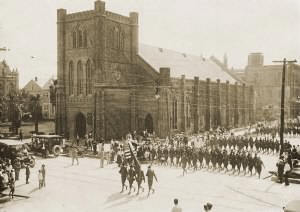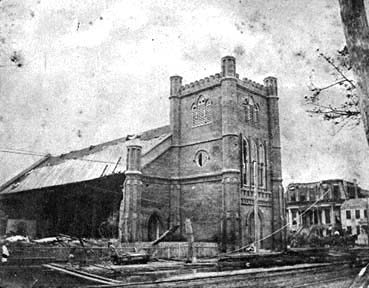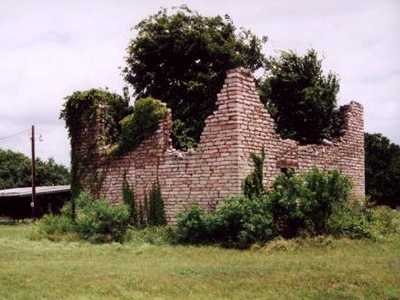| |
Churches
Have Been Doing Their Best to Mask Financial Troublesby
Bill Cherry | |
While
there's reason to question whether it's academically theological, one rather consistent
message Western religions infer in their teachings boils down to this: Don't worry
about It. As long as we pray about It, we can leave It in
God's hands, and everything will be alright.
Many find it troubling to
drive by their city's old churches,
some ornate and opulent, others designed and built to be clean, pristine and sturdy,
and to realize that for years those buildings have been decaying.
Each one began as a congruent vision by a handful of people who somehow were able
to take that vision and persuade others to support it. With only a wishful concept
to sell, they raised the money to eventually construct those enormously expensive
buildings. Many have been on their corners for more than 100 years.
The
founders were sure that the churches
and ancillary buildings would forever live on to spiritually nourish the community.
They felt certain that the generations that followed would keep them up and add
to them. Membership and financial support would surely increase exponentially.
Those peaceful resolves had to have been the spirit behind each church and synagogue,
lest services would have remained in homes, public auditoriums, on street corners
and in tents full of folding chairs and cardboard funeral home fans.
The
founders would be disappointed if they were here today. As time has passed, the
memberships have become lethargic, devotion has declined, and church-family financial
support has lost a great deal of its wind. Without the strong membership resolve
that the churches had when they were founded, the current congregants find themselves
defaulting to that false hope, "We'll leave It in God's hands and
everything will be alright."
So while they've been waiting on God
to take care of things; rightfully God's been waiting for them to do it. During
this standoff, they have masked the structural problems with spackle, caulk, putty
and paint. They've hoped that the rats that are eating away at the electrical
wiring's insulation won't be electrocuted, thus sending the fire-causing sparks
that will destroy the entire campus. And what about the termites and beetles that
are digesting the wall framing and roof trusses? Will a wall eventually fall into
the yard, they secretly wonder?
For
awhile masking the truth has bought time. At least people driving by or going
to an occasional wedding or the funeral of a friend haven't noticed that the church
was just squeaking by; that year after year there had been no room in the finances
to budget for major repairs and improvements; and that church involvement had
seriously declined.
But the committed members left behind have known all
along, deep in their souls, that the solution would require families to stop just
borrowing the facilities when they needed them for weddings and funerals and day
school, or every now and then on Sunday, Christmas, Easter, or on Hanukkah and
Passover, and to accept their responsibility as owners and members of their church's
business partnership.
With this comes an irony that began in Old Testament
days. People won't live in or support a community that doesn't have good churches
and synagogues. In fact, one of the first questions Realtors have to address
when a family is considering moving to a new town is, "Where's my church?"
Not necessarily that the family plans to join or attend much less to send a regular
contribution or to tithe, but they see it as a good sign that the town isn"t
morally corrupt.
Like public parks and government
buildings and streets, churches
pay no property taxes. It was never meant to be a benevolent financial break for
the faithful; instead, it's a subtle encouragement for churches
to exist so that the town has perceived value. |
 |
| World
War I Victory Parade passing the Trinity Episcopal Church in 1918 - Photo
courtesy Bill Cherry |
One
church, Trinity Episcopal Church in Galveston,
started in the early 1800s when twelve people raised $4,000 to buy a tract of
land and to construct a small frame building. Within a year, a hurricane had come
through and blown it off of its foundation. They righted it.
More hurricanes
followed, plus a Civil War battle that left a cannon ball buried in its south
wall, then the big fire that burned most of downtown, the yellow fever epidemic,
the births, marriages and deaths of generations, and the Great Depression, but
the members continued building it, adding one brick
at a time. Today, the buildings encompass an entire city block. The church is
loaded with irreplaceable stained glass windows, a full set of chimes in its belfry,
and an organ with more than 4,000 pipes. While there used to be a lot more members,
still about two hundred worship there each Sunday. And throughout the week more
than 250 children attend its school. |
 |
| Trinity Episcopal
Church - The south wall blown down as the result of the 1900 Storm. Photo courtesy
Bill Cherry |
Nevertheless this
church finds itself in need of $2 million if it is to save its buildings and do
no more than continue the visionary mission of its founders of 150 years ago.
While the amount needed for restoration and program continuance surely
differs from church to church, the questions are the same and as perplexing. Why
does the church need so much? Where will it come from? It is so much because for
years the church was unable to save for a rainy day. The congregants, in the main,
took out more than they put back in. Many simply took a free ride. And where it
will come from is from those who know it's important for the churches to continue
their places in the community. Everyone of them prays their collective financial
strength will be enough for their church to endure.
A town without good,
viable churches and that are without supportive and enthusiastic members is empirically
a town in a state of overall decline. That condition
is severely costly to the spirit, moral and financial viability of the community.
Some say that's where many are today. Iím one of those.
Bill
Cherry's Galveston Memories
August 3, 2008 column
Copyright William S. Cherry
All rights reserved |
 |
Related Topics:
Texas | Online
Magazine | Galveston
|
Book your hotel here and save:
Galveston Hotels
Bill Cherry, a Dallas Realtor and free lance writer was a longtime
columnist for "The Galveston County Daily News." His book, Bill Cherry's Galveston
Memories, has sold thousands, and is still available at Barnes and Noble and
Amazon.com and other bookstores. |
|
|
|